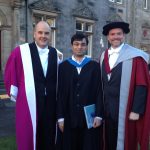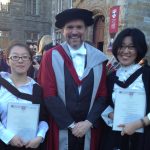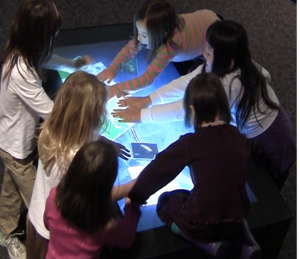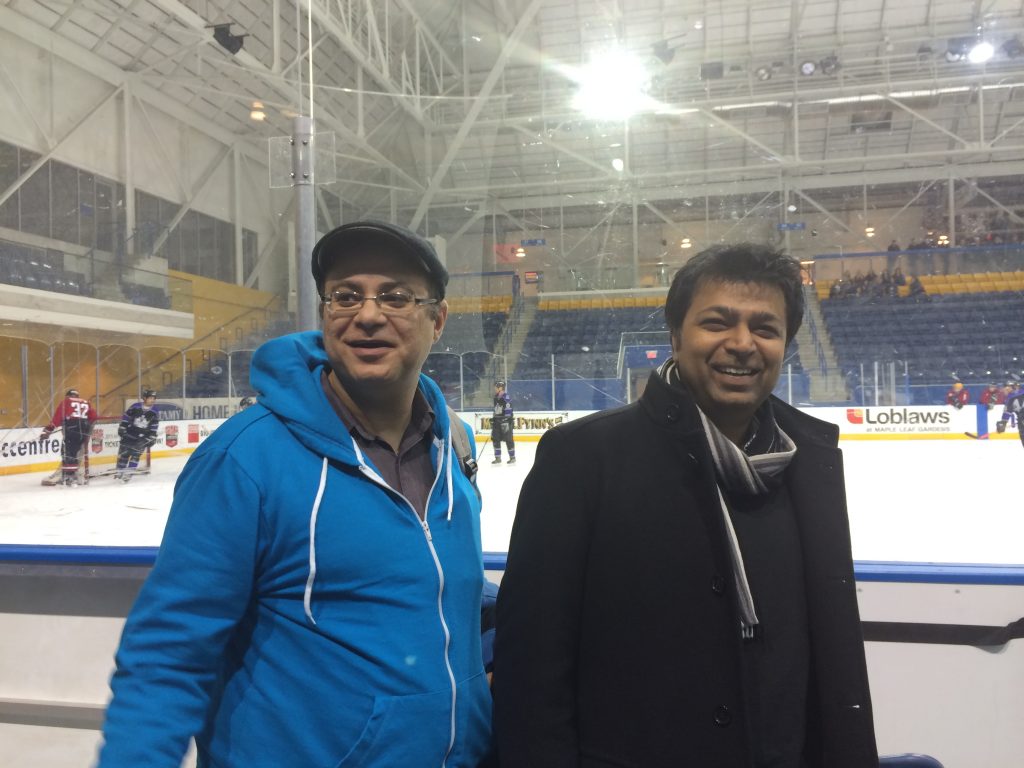We are pleased to announce that Professor Aaron Quigley and Dr. Sara Diamond the President of the Ontario College of Art and Design University are the general co-chairs for MobileHCI 2014 the 16th International Conference on Mobile Human-Computer Interaction in Toronto, Canada. Associate Professor Pourang Irani, University of Manitoba invited Aaron to join this Canadian organising committee as an international member.
The chairs, Dr. Sara Diamond and Professor Aaron Quigley, have extensive experience organizing and managing academic conferences. Sara Diamond is President of the Ontario College of Art and Design University (OCAD U), Canada’s premiere university institution targeted at Art and Design and based in Toronto, proposed home for MobileHCI 2014. Aaron is the Chair of Human Computer Interaction at the School of Computer Science, University of St. Andrews, Scotland. He directs the St. Andrews Computer Human Interaction Research Group. Building upon a vast repertoire of resources available locally, nationally and internationally, both chairs look forward to delivering a successful and exciting MobileHCI 2014 event in Toronto.
News
Next year Miguel will join the program committee for the 2nd International Symposium on Pervasive Displays 2013 in cooperation with ACM / SIGCHI
“As digital displays become pervasive, they become increasingly relevant in many areas, including advertising, art, sociology, engineering, computer science, interaction design, and entertainment. We invite submissions that report on cutting-edge research in the broad spectrum of pervasive digital displays, from large interactive walls to personal projection, from tablets and mobile phone screens to 3-D displays and tabletops. The symposium on Pervasive Displays welcomes work on all areas pertaining to digital displays”. http://www.pervasivedisplays.org/2013/
 Aaron and Per Ola are two of the Associate Chairs for MobileHCI 2013, the 15th International Conference on Human-Computer Interaction with Mobile Devices and Services (MobileHCI 2013) which will be held in Munich, Germany August 27 – 30, 2013.
Aaron and Per Ola are two of the Associate Chairs for MobileHCI 2013, the 15th International Conference on Human-Computer Interaction with Mobile Devices and Services (MobileHCI 2013) which will be held in Munich, Germany August 27 – 30, 2013.
“MobileHCI is the world’s leading conference in the field of Human Computer Interaction concerned with portable and personal devices and with the services to which they enable access. MobileHCI provides a multidisciplinary forum for academics, hardware and software developers, designers and practitioners to discuss the challenges and potential solutions for effective interaction with and through mobile devices, applications, and services.” http://www.mobilehci2013.org/ Per Ola is also the workshops co-chair for MobileHCI 2013, the call for workshops 2013 is here.
Aaron  will be joining the Technical Program Committee of the 2013 ACM International Conference on Pervasive and Ubiquitous Computing (UbiComp 2013).
will be joining the Technical Program Committee of the 2013 ACM International Conference on Pervasive and Ubiquitous Computing (UbiComp 2013).
The UbiComp 2013 Program Chairs are Marc Langheinrich, John Canny, and Jun Rekimoto and they said of UbiComp 2013. That it is the first merged edition of the two most renowned conferences in the field: Pervasive and UbiComp. While it retains the “UbiComp” short-name in recognition of the visionary work of Mark Weiser, its long name (and focus) reflects the dual history of the new event, i.e., it seeks to publish any work that one would previously expect to find at either UbiComp or Pervasive. The conference will take place from September 8-12 in Zurich, Switzerland. Aaron has previously served on a number of Pervasive and UbiComp Technical program committees and looks forward to serving on this first joint conference UbiComp TPC which is now the premier forum for Ubiquitous and Pervasive Computing research.
http://www.ubicomp.org/
Next week Professor Quigley is presenting a seminar in the University of Konstanz, Germany as an invited speaker by Professor Harald Reiterer
Abstract:
The computational and contextual edifice around which we will build our ubicomp user interfaces is complex and constantly changing. This context include physiological, environmental and computational state. In this regard, can we model the physiological differences between people and use the models to adapt and personalize designs, user interfaces and artefacts? Can we model, measure and predict the cost of users altering their gaze in single or multi-display environments? If so, can we personalize interfaces using this knowledge. What about when moving and while the distance between user and screen is varying. Can this be considered a new modality and used to personalize the interfaces along with physiological differences and our current gaze. In this talk we seek to answer some of these questions. We define Ubicomp User Interfaces and introduce an Individual Observer Model of human eyesight, which we use to simulate 3600 biologically valid human eyes. We also report on controlled lab and outdoor experiments with real users. This is to measure both gaze and distance from the screen in an attempt to quantify the cost of attention switching along with the use of distance as a modality. In each case, for distance, gaze or expected eyesight we would like to develop models which can allow us to make predictions about how easy or hard it is to see visual information and visual designs, along with altering the designs to suit individual users based on their current context.
 Today is St Andrews day and a number of current and former SACHI members graduated from the University of St Andrews.
Today is St Andrews day and a number of current and former SACHI members graduated from the University of St Andrews.
Dr Umar Rashid who was supervised by Professor Aaron Quigley and Dr Miguel Nacenta was awarded his PhD for a thesis entitled “Cross-Display Attention Switching in Mobile Interaction with Large Displays”. Dr Per Ola Kristensson was his internal examiner and Dr Adrian Friday from the University of Lancaster was his external examiner. 
Jing Sun and Hong Xue who were supervised by Professor Aaron Quigley graduated with the Degree of M.Sc. Hong was awarded the Medal for M.Sc. in Information Technology and the School of Computer Science Award in Information Technology. Bin Han who was supervised by Dr Per Ola Kristensson graduated with the Degree of M.Sc. Moses Akazue supervised by Dr Miguel Nacenta graduated with the Degree of M.Sc. 
Anne-Marie Mann who is now a PhD student in SACHI graduated with the Degree of M.Sc.
 SACHI along with other colleagues in Computer Science and across St Andrews are organising a SICSA supported “Big Data Information Visualisation” summer school in July of 2013. We are working on developing the program for this summer school bringing together expertise in a number of areas. Over the weeks and months ahead we will be adding to this website as we confirm topics and speakers. We already have a number of colleagues locally dealing with big data who are willing to act as mentors and domain experts during the summer school.
SACHI along with other colleagues in Computer Science and across St Andrews are organising a SICSA supported “Big Data Information Visualisation” summer school in July of 2013. We are working on developing the program for this summer school bringing together expertise in a number of areas. Over the weeks and months ahead we will be adding to this website as we confirm topics and speakers. We already have a number of colleagues locally dealing with big data who are willing to act as mentors and domain experts during the summer school.
Professor Quigley is presenting a seminar in the University of Zurich as an invited speaker by Dr Elaine Huang.
Seminar abstract: Our bodies shape our experience of the world, and our bodies influence what we design. How important are the physical differences between people? Can we model the physiological differences and use the models to adapt and personalize designs, user interfaces and artefacts? Can we model, measure and predict the cost of users altering their gaze in single or multi-display environments? If so, can we personalize interfaces using this knowledge. What about when moving and while the distance between user and screen is varying. Can this be considered a new modality and used to personalize the interfaces along with physiological differences and our current gaze. In this talk we seek to answer some of these questions. We introduce an Individual Observer Model of human eyesight, which we use to simulate 3600 biologically valid human eyes. We also report on controlled lab and outdoor experiments with real users. This is to measure both gaze and distance from the screen in an attempt to quantify the cost of attention switching along with the use of distance as a modality. In each case, for distance, gaze or expected eyesight we would like to develop models which can allow us to make predictions about how easy or hard it is to see visual information and visual designs, along with altering the designs to suit individual users based on their current context.
 3 presentations on the state of the art
3 presentations on the state of the art
Open to all public
Tue Oct 16 – 1:30pm to 2:30pm
School VI Lecture Theatre, St Salvator’s Quad
Visit http://sachi.cs.st-andrews.ac.uk/activities/workshops/interactive-technologies-for-libraries-and-museums/ for more details.
When: Wednesday 12th of September 9:30am – 5pm (with a 1 hour break for lunch)
Where: Sub-honours lab in Jack Cole building (0.35)
As part of this competition, you may be offered an opportunity to participate in a Human-Computer Interaction study on subtle interaction. Participation in this study is completely voluntary.
There will be two competitive categories:
HCI study participants:
1st prize: 7” Samsung Galaxy Tab 2
2nd prize: £50 Amazon voucher
3rd prize: £20 Amazon voucher
Everyone:
1st prize: £50 Amazon voucher
2nd prize: £20 Amazon voucher
3rd prize: £10 Amazon voucher
We will try to include as many programming languages as is reasonable, so if you have any special requests, let us know.
If you have one, bring a laptop in case we run out of lab computers!
If you have any questions, please email Jakub on jd67@st-andrews.ac.uk


